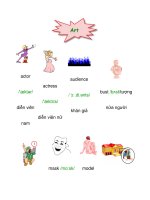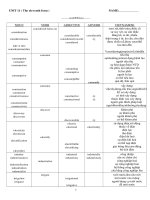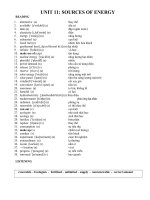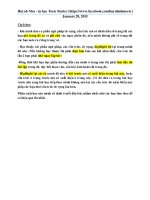TỪ VỰNG TOEIC unit 11
Bạn đang xem bản rút gọn của tài liệu. Xem và tải ngay bản đầy đủ của tài liệu tại đây (256.81 KB, 60 trang )
Unit 11
CANT LINGU SPIR VER TURB VOLU/VOLV FAC LUM Words from
Mythology and History
Quiz 11-1 Quiz 11-2 Quiz 11-3 Quiz 11-4 Quiz 11-5 Review Quizzes 11
CANT, from the Latin verb cantare, meaning “sing,” produces several words
that come directly from Latin. But some others came to English by way of
French, which added an h to the root, giving us such words as chant and
chantey.
cantata
A musical composition, particularly a religious work
from the 17th or 18th century, for one or more voices accompanied by
instruments.
• Composers of the 18th century composed sacred cantatas by the dozen, and
Bach's friend G. P. Telemann actually wrote over a thousand.
A cantata is sung, unlike a sonata, which is played on instruments only. The
most famous cantatas are by Johann Sebastian Bach, who wrote the music for
about 200 religious cantatas, using hymns and new religious poems as his
texts. His cantatas consisted of several different sections for different voices
—solos, duets, and choruses. Some of his nonreligious cantatas have been
performed like mini-operas.
incantation
(1) A use of spells or verbal charms spoken
or sung as part of a ritual of magic. (2) A formula of words used in, or as if
in, such a ritual.
• He repeated the words slowly over and over like an incantation.
Incantation comes directly from the Latin word incantare, “enchant.”
Incantare itself has cantare as a root, which reminds us that magic and ritual
have always been associated with chanting and music. Incantations have
often been in strange languages; “Abracadabra” is a not-so-serious version of
an incantation.
cantor
An official of a Jewish synagogue who sings or chants the
music of the services and leads the congregation in prayer.
• The congregation waited for the cantor to begin the prayers before joining
in.
The cantor is, after the rabbi, the most important figure in a Jewish worship
service. A cantor not only must possess an excellent singing voice but also
must know by heart long passages of Hebrew. Cantors such as Jan Peerce and
Richard Tucker became international opera stars. The comedian and singer
Edward Israel Iskowitz renamed himself Eddie Cantor for his original
profession and became enormously popular on stage, screen, radio, and
television for over 40 years.
descant
An additional melody sung above the principal melody.
• The soprano added a soaring descant to the final chorus that held the
listeners spellbound.
The prefix des-, meaning “two” or “apart,” indicates that the descant is a
“second song” apart from the main melody. In popular songs a descant will
often be sung at the very end to produce a thrilling climax.
LINGU comes from the Latin word that means both “tongue” and
“language,” and in English today tongue can still mean “language” (as in “her
native tongue”). Our expression “slip of the tongue” is just a translation of
the Latin phrase lapsus linguae. The root even shows up in a slangy-sounding
word like lingo. And since lingu- changed to langu- in French, our word
language is related as well.
linguistics
The study of human speech.
• The new speechwriter, who had majored in linguistics, was soon putting his
knowledge of the deceptive tricks of language to good use.
Any analysis of language, including 8th-grade grammar, can be called
linguistics. As recently as 200 years ago, ordinary grammar was about the
only kind of linguistics there was. Today a linguist may be a person who
learns foreign languages, but the term usually refers to people who devote
themselves to analyzing the structure of language. Many linguists concentrate
on the history of a language; others study the way children learn to speak;
others analyze the sounds of a language—and still others just study English
grammar, a subject so big that you could easily spend your entire life on it.
multilingual
Using or able to use several languages.
• She soon discovered that he was truly multilingual, fluent in not only the
German and Polish he had grown up speaking but in English and Arabic as
well.
The roots of multilingual come from Latin (see MULTI). If you happen to
prefer Greek, use the synonym polyglot, in which poly- has the same meaning
as multi-, and -glot means the same thing as -lingual. The best way to become
multilingual is probably to be born in a bilingual (two-language) household;
learning those first two seems to give the mind the kind of exercise that
makes later language-learning easy.
lingua franca
A language used as a common or
commercial language among peoples who speak different languages.
• That first evening in Tokyo, she heard English being spoken at the next
table, and realized it was serving as a lingua franca for a party of Korean and
Japanese businessmen.
In the Middle Ages, the Arabs of the eastern Mediterranean referred to all
Europeans as Franks (the name of the tribe that once occupied the land we
call France). Since there was plenty of Arab-European trade, the traders in the
Mediterranean ports eventually developed a trading language combining
Italian, Arabic, and other languages, which almost everyone could more or
less understand, and it became known as the “Frankish language,” or lingua
franca. Some languages actually succeed in becoming lingua francas without
changing much. So, when the Roman empire became vast and mighty, Latin
became the important lingua franca; and at a meeting between Japanese and
Vietnamese businesspeople today, English may well be the only language
spoken.
linguine
A narrow, flat pasta.
• As a test of her clients' table manners, she would serve them challenging
dishes and watch to see how gracefully they could handle chopsticks or deal
with long, slithery linguine.
The modern language closest to Latin is Italian, and the Italian word linguine
means literally “little tongues.” Linguine is only one of the types of pasta
whose names describes their shapes. Others include spaghetti (“little
strings”), fettuccine (“little ribbons”), penne (“little quills”), orzo (“barley”),
farfalle (“butterflies”), vermicelli (“little worms”), capellini (“little hairs”),
fusilli (“little spindles”), and radiatori (“little radiators”). If you're thinking
about learning Italian, you could make a good start by just visiting an Italian
restaurant.
Quiz 11-1
A. Choose the closest definition:
1. descant
a. climb downward b. added melody c. supposed inability d.
writing table
2. linguistics
a. language study b. reading c. mouth surgery d. tongue exercise
3. incantation
a. ritual chant b. ceremony c. solemn march d. recorded song
4. linguine
a. slang b. pasta c. Italian dessert d. common language
5. cantata
a. snack bar b. pasta dish c. sung composition d. farewell gesture
6. lingua franca
a. Old French b. common language c. Italian casserole d. French
coin
7. cantor
a. singer b. refusal c. traitor d. gallop
8. multilingual
a. highly varied b. in separate parts c. born with multiple tongues d.
fluent in several languages
Answers
B. Indicate whether the following pairs of words have the same or
different meanings:
1. lingua franca / pasta dish
same ___ / different ___
2. incantation / sacred dance
same ___ / different ___
3. linguine / Italian language
same ___ / different ___
4. descant / enchant
same ___ / different ___
5. linguistics / science of singing
same ___ / different ___
6. cantata / sonata
same ___ / different ___
7. cantor / conductor
same ___ / different ___
8. multilingual / using several fingers
same ___ / different ___
Answers
SPIR comes from the Latin words meaning “breath” and “breathe.” When we
inspire others—that is, give them inspiration—it's as though we're breathing
new energy and imagination into them. When you expire, or die, you
“breathe out” your soul in your last breath. A license, membership, credit
card, or free offer may also expire, at a time indicated by its expiration date.
spirited
Full of energy or courage; very lively or determined.
• The team put up a spirited defense, but they were doomed from the start.
You may see spirited used to describe a conversation, a debate, a horse, or a
campaign. And it often shows up in such words as high-spirited (“bold and
energetic”), mean-spirited (“spiteful”), and public-spirited (“generous to a
community”), all of which reflect the original meaning of spirit, a notion
much like “soul” or “personality.”
dispiriting
Causing a loss of hope or enthusiasm.
• It was terribly dispiriting for them to lose yet another game, and he had to
reassure his daughter that she'd actually done a great job as goalie.
Lots of things can be dispiriting: a bad job interview, an awful film, a
relationship going sour. Maybe for that reason, dispiriting has lots of
synonyms: discouraging, disheartening, demoralizing, depressing, etc.
respirator
(1) A device worn over the nose and mouth to
filter out dangerous substances from the air. (2) A device for maintaining
artificial respiration.
• His lungs had been terribly damaged by decades of heavy smoking, and he'd
been living on a respirator for the last year.
Respiration means simply “breathing.” We usually come across the word in
artificial respiration, the lifesaving technique in which you force air into the
lungs of someone who's stopped breathing. Respirators can take several
different forms. Scuba-diving equipment always includes a respirator, though
it doesn't actually do the breathing for the diver. Medical respirators, which
are used especially for babies and for emergency care and actually take over
the job of getting oxygen into the lungs, are today usually called ventilators,
so as to distinguish them from simple oxygen systems (which merely provide
a steady flow of oxygen into the nostrils) and face masks.
transpire
(1) To happen. (2) To become known.
• We kept up our questioning, and it soon transpired that the boys had known
about the murder all along .
Since the prefix trans- means “through” (see TRANS), transpire's most
literal meaning is something like “breathe through.” Thus, the original
meaning of the English word—still used today—is to give off a watery vapor
through a surface such as a leaf. From there, it came to mean also the gradual
appearance of previously secret information, as if leaking out of the pores of
a leaf (as in “It transpired that she was not only his employee but also his
girlfriend”). And soon it was being used to mean simply “happen” (as in “I
wondered what had transpired in the cafeteria at lunchtime”).
VER comes from the Latin word for “truth.” A verdict in a trial is “the truth
spoken” (see DICT). But a just verdict may depend on the veracity, or
“truthfulness,” of the witnesses.
verify
accuracy of.
(1) To prove to be true or correct. (2) To check or test the
• It is the bank teller's job to verify the signature on a check.
During talks between the United States and the former Soviet Union on
nuclear weapons reduction, one big problem was how to verify that weapons
had been eliminated. Since neither side wanted the other to know its secrets,
verification of the facts became a difficult issue. Because of the distrust on
both sides, many doubted that the real numbers would ever be verifiable.
aver
To state positively as true; declare.
• The defendant averred that she was nowhere near the scene of the crime on
the night in question.
Since aver contains the “truth” root, it basically means “confirm as true.”
You may aver anything that you're sure of. In legal situations, aver means to
state positively as a fact; thus, Perry Mason's clients aver that they are
innocent, while the district attorney avers the opposite. If you make such a
statement while under oath, and it turns out that you lied, you may have
committed the crime of perjury.
verisimilitude
(1) The appearance of being true or
probable. (2) The depiction of realism in art or literature.
• By the beginning of the 20th century, the leading European painters were
losing interest in verisimilitude and beginning to experiment with abstraction.
From its roots, verisimilitude means basically “similarity to the truth.” Most
fiction writers and filmmakers aim at some kind of verisimilitude to give their
stories an air of reality. They need not show something actually true, or even
very common, but simply something believable. A mass of good details in a
play, novel, painting, or film may add verisimilitude. A spy novel without
some verisimilitude won't interest many readers, but a fantastical novel may
not even attempt to seem true to life.
veracity
truthful or honest.
(1) Truth or accuracy. (2) The quality of being
• We haven't been able to check the veracity of most of his story, but we
know he wasn't at the motel that night.
People often claim that a frog placed in cold water that then is gradually
heated will let itself be boiled to death, but the story actually lacks veracity.
We often hear that the Eskimo (Inuit) peoples have dozens of words for
“snow,” but the veracity of the statement is doubtful, since Eskimo languages
seem to have no more snow words than English (with flake, blizzard, powder,
drift, freezing rain, etc.). In 2009 millions accepted the veracity of the claim
that, against all the evidence, the elected president wasn't a native-born
American. Not all the “facts” we accept without thinking are harmless.
Quiz 11-2
A. Fill in each blank with the correct letter:
a. transpire
b. aver
c. respirator
d. verify
e. spirited
f. veracity
g. dispiriting
h. verisimilitude
1. Maybe some new information will ___ when they question the family
tomorrow.
2. The company was doing badly, and she'd been having problems with her
boss, so all in all it had been a ___ week at work.
3. The prosecutor expected the witness to ___ that the suspect was guilty.
4. Critics complained about the lack of ___ in his crime writing, saying it
sounded as if he'd never even been inside a police station.
5. There's always a ___ exchange of opinions around the Thanksgiving table,
but nobody ever takes offense.
6. His father has been living on a ___ for the last two weeks, but now his
lungs seem to be improving.
7. She was never able to ___ anything he had told her about his past.
8. The boys claim they never went near the river that afternoon, but we
suspect their ___.
Answers
B. Complete the analogy:
1. believe : doubt :: aver : ___
a. state b. mean c. deny d. subtract
2. transfer : hand over :: transpire : ___
a. breathe out b. cross c. encourage d. come to light
3. illusion : fantasy :: verisimilitude : ___
a. appearance b. realism c. style d. proof
4. gloomy : glum :: spirited : ___
a. spiraling b. alcoholic c. lively d. complex
5. loyalty : treason :: veracity : ___
a. dishonesty b. truthfulness c. ideals d. safekeeping
6. exciting : thrilling :: dispiriting : ___
a. dreary b. calming c. relaxing d. soothing
7. praise : ridicule :: verify : ___
a. testify b. contradict c. establish d. foretell
8. pacemaker : heart :: respirator : ___
a. kidneys b. brain c. liver d. lungs
Answers
TURB comes from the Latin verb turbare, “to throw into confusion or
upset,” and the noun turba, “crowd” or “confusion.” So a disturbance, for
example, confuses and upsets normal order or routine.









